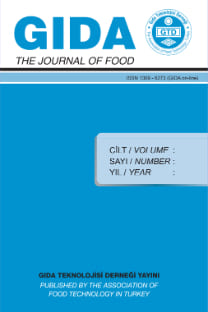Beta D Galaktosidaz Enzimi Kullanılarak Yapılan Yoğurtların Kalite Kriterleri Üzerine bir Araştırma
Bu çalışmada yoğurt üretiminde kullanılan β D Galaktosidaz enzim preparatının ürün kalite kriterleri üzerine olan etkileri incelenmiştir. 0.1, 0,2 ve 0,3 ml/lt enzim ilave edilerek yaklaşık % 30, 50, 70 ve 90 laktoz hidrolizasyonu sağlanmıştır. Enzimin süte ilavesiyle hazırlanan yoğurtların pıhtılaşma süresi, depolama sürecinde l. ve 14.günlerde konsistens, titrasyon asitliği, asetaldehit ve tirozin değerleri saptanmış ve duyusal değerlendirmeleri yapılmıştır. Laktoz hidrotizasyonunun pıhtılaşma süreleri üzerine kısaltıcı etkisi önemli, titrasyon asitliği ve konsistens değerleri üzerine olan etkisi ise önemsiz bulunmuştur. Enzimle işlem görmüş örneklerin 1. günde asetaldehit ve tirozin değerlerinde artış meydana gelmiştir. Depolama sürecinde tirozin değerleri artarken, asetaldehit miktarları azalmıştır. Toplam duyusal değerlendirmelerde ise panelistler % 50 (A) ve % 70 (B) hidrolizasyon sağlanan örnekleri daha çok beğenmişlerdir.
Anahtar Kelimeler:
β D Galaktosidaz, Hidroliz, Laktoz hidrolizasyonu, Yoğurtta β D Galaktosidaz kullanımı
A Study on the Quality Criteria of Yoghurts Manufactured by Using Beta D Galactosidase Enzyme (Turkish with English Abstract)
In this study, the effects of β.D. Galactosidase enzyme preparation which was used in yoghurt manufacturing on some quality criteria of the final product, were investigated. By adding 0.1 ml, 0.2 m1 and 0.3 ml enzyme to 1 liter of milk, approximately 30%, 50%, 70% and 90% hydrolysis of lactose were achieved, respectively. In yoghurt samples, obtained by adding enzyme to milk, coagulation time, consistency, titratable acidity, acetaldehyde content and level of tyrosine as well as organoleptic properties were determined during the first and 14 days of storage. Titratable acidity and consistency of yoghurts was not affected by the process of hidrolysis. While acetaldehyde and tyrosine con-tents of the enzyme-treated samples increased. During the storage period, an increase in the level of tyrosine was observed a decrease in the contents of acetaldehyde was found on the contrary. According to the overall score, yoghurt samples, manufactured by hydrolysis, 50% (A) and 70%(B) lactose was found better than the other by the panel members.
Keywords:
β.D. Galactosidase, Hydrolysis, Lactose hydrolysis, use of β. D. Galactosidase in yoghurt ,
- ISSN: 1300-3070
- Yayın Aralığı: Yılda 6 Sayı
- Başlangıç: 1976
- Yayıncı: Prof. Dr. İbrahim ÇAKIR
Sayıdaki Diğer Makaleler
Tütsülemenin Et Ürünlerindeki Etkileri
Üniversite Öğrencilerinin Beslenme Durumları Üzerinde bir Araştırma
Beta D Galaktosidaz Enzimi Kullanılarak Yapılan Yoğurtların Kalite Kriterleri Üzerine bir Araştırma
Seval Kırdar, Emel Sezgin, Metin Atamer
Üzümlerde ve Şaraplarda Resveratrol Oluşumu
Sağlık Personelinin Beslenme Alışkanlıkları Üzerinde bir Araştırma
Alkollü İçkilerin Analizlerinde Yararlanılan Kemilüminesans Yöntemler
Hazır Çorba Üretiminde Kuru Bezelye Kullanım Olanağının Araştırılması
